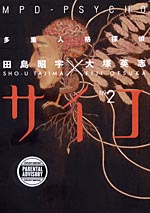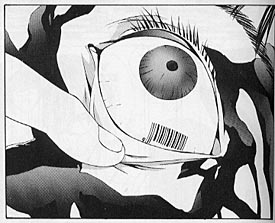 Written by Eiji Otsuka
Written by Eiji Otsuka
Art by Sho-u Tajima
184 pages, black and white
Published by Dark Horse
I feel like I should open up this review with a note of congratulations to the creators and publishers of the book. So, to Sho-u Tajima, Eiji Otsuka, Kadokawa Soten, and Dark Horse, well done. You’ve done what very few other comics have managed; I was thoroughly disturbed by reading your comic, yet I’m dying to read more. I’m not sure what this says about you, me, or this comic—but for now I’m going to assume the comic. It’s going to help my peace-of-mind with the idea that a book about a series of disturbing and horrific murders and a multiple-personality-profiler helping solve them is not, in fact, a trope that would hook me regardless of quality.
Yousuke Kobayashi was once a police detective, well-known for his profiling abilities to analyze a crime scene and determine what sort of person to look for. Then Yousuke killed a criminal who was at his mercy—but the killing was enacted by a different personality inside of Yousuke’s head. Now, several years later, he’s out of prison and the employee of Machi Isono, another former police officer, who just founded a criminal research lab. Together, they’re solving vicious and horrific crimes… but what other surprises are lurking inside of Yousuke’s head? Can he really be trusted?
Eiji Otsuka’s writing in The Kurosagi Corpse Delivery Service didn’t prepare me in any way for MPD-Psycho. While both deal with death, the former never really hits higher than a level of “slightly creepy.” Here? The creep factor is dialed up as far as it can go. The ideas that Otsuka comes up with for MPD-Psycho are continually off kilter and creepy, but at the same time there’s a lot more than just a simple gross-out factor. I appreciated the fact that there’s very clearly a larger story spinning out, one involving the organization putting bar codes on people’s eyeballs. There’s more to it than just that, though. I’ve really appreciated the untrustworthy nature of Yousuke, with new personalities starting to emerge over time and the continual question arising on if we can really trust him at all. It’s a cliché and it shouldn’t really work, but Otsuka’s careful attention to the idea makes it somehow come together in a satisfactory way. On the other hand, I have to say that the attempts to shoehorn Machi’s younger sister Miwa into the stories have felt a bit off; she’s not quite at the level of “annoying younger sidekick” but it’s one misstep away from happening. Still, it’s a minor enough problem that I’m willing to forgive it.
 Sho-u Tajima’s art is nothing short of disturbing. It’s much to Tajima’s credit that getting directives like, “Plants growing out of the top of people’s brains” comes across as both a realistic and horrific image at the same time. The temptation would certainly be there to make the events of the book cartoonish so to make it more palatable to the reader, but that never happens in MPD-Psycho. Tajima keeps the people and events of the story looking very realistic; the closest you get to stylistic license has more to do with Tajima drawing such thick locks of hair clustered all over people’s heads than any sort of unrealistic final product. As disturbing as the ideas that Otsuka dreams up are, it’s Tajima’s ultimate execution of those ideas that helps make MPD-Psycho such a creepy experience.
Sho-u Tajima’s art is nothing short of disturbing. It’s much to Tajima’s credit that getting directives like, “Plants growing out of the top of people’s brains” comes across as both a realistic and horrific image at the same time. The temptation would certainly be there to make the events of the book cartoonish so to make it more palatable to the reader, but that never happens in MPD-Psycho. Tajima keeps the people and events of the story looking very realistic; the closest you get to stylistic license has more to do with Tajima drawing such thick locks of hair clustered all over people’s heads than any sort of unrealistic final product. As disturbing as the ideas that Otsuka dreams up are, it’s Tajima’s ultimate execution of those ideas that helps make MPD-Psycho such a creepy experience.
MPD-Psycho isn’t even remotely a book for everyone. It enjoys its slimy, slightly vile nature but never seems to revel in it too much. Over time there’s the chance that it could slip into self-parody or grow stale, but for now? It’s a fresh, unflinching look at a story that I think a lot of creators might be afraid to approach. It’s not for the faint of heart, but for those who have long outgrown CSI, MPD-Psycho may be just what you’re looking for.
Purchase Links:
Volume 1:
